News & Event
President Talks (with Hidenobu Jinnai, Professor at the Faculty of Engineering and Design and Director of the Hosei University Research Center for Edo-Tokyo Studies)
Gaining New Perspectives on Tokyo through Explorations of Edo: Urban Intelligence Expanded by Edo-Tokyo Studies
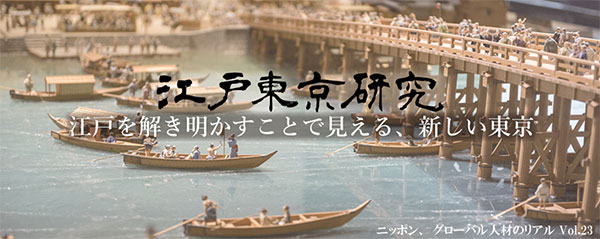
Tokyo is a city shaped by destruction and restoration. A brief look at even just recent history shows that neither the Great Kanto Earthquake nor the so-called Great Tokyo Air Raid could unseat the city from its lofty position as the beating heart of Japan. With development projects still in progress in some areas, Tokyo is in the midst of an ongoing process of evolution toward 2020.
It is generally supposed that Tokyo, serving as the heart of Japan for over 400 years—that is, since the establishment of the Tokugawa shogunate—has formed amazingly thick layers of history. Nevertheless, studies on Tokyo have a rather short history. “Edo-Tokyo studies” aimed at examining the city of Edo-Tokyo were only advocated in the early 1980s. This means that less than 30 years have passed since integrated studies on the city from the Edo period to the present were initiated.
In AY2017, Edo-Tokyo studies as an academic discipline got a massive boost when Hosei University established the Center for Edo-Tokyo Studies (EToS) to explore Edo-Tokyo in an integrated way, taking on the dual perspectives of culture and architecture.
Amid the progress of globalization, and with 2020 just around the corner, it is difficult to imagine how Tokyo would be able to stand still. Below is a conversation with Hosei University President Yuko Tanaka and Professor Hidenobu Jinnai, both of whom conduct research at EToS.
Yuko Tanaka
President, Hosei University
Yuko Tanaka completed all PhD requirements other than the dissertation for the doctoral program at Hosei University’s Graduate School of Humanities. She specializes in literature and lifestyle culture in the Edo period and comparative studies on Asian cultures. Her public appointments include being a member of the Tokyo 2020 Expert Colloquium for the Tokyo Organising Committee of the Olympic and Paralympic Games. Her books include Edo Hyakumu (lit.: One Hundred Dreams of the Edo Period; Asahi Shimbun Publications; winner of the Suntory Prize for Social Sciences and Humanities).
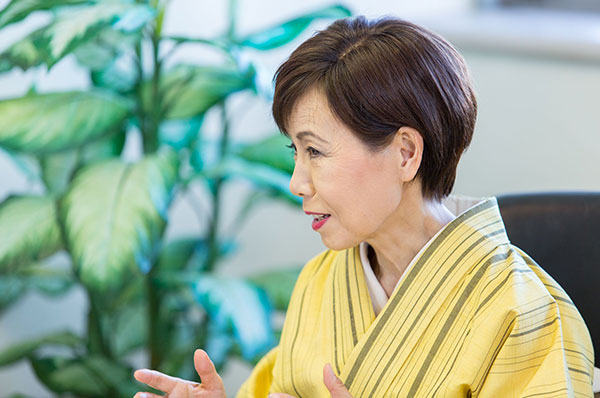
Hidenobu Jinnai
Professor, Faculty of Engineering and Design, Hosei University
Hidenobu Jinnai studied at Università Iuav di Venezia and got his doctorate from the University of Tokyo’s Graduate School of Engineering. He specializes in Italian architectural and urban history. His public appointments include Director of the Chuo Historical Museum / Planetarium. His books include Tokyo: A Spatial Anthropology (University of California Press; original Japanese version published by Chikuma Shobo; winner of the Suntory Prize for Social Sciences and Humanities) and Tokyo (in Japanese; Bungeishunju).
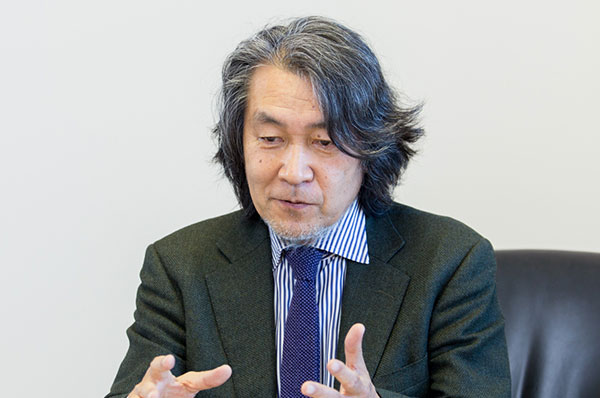
Focusing on geographical rather than temporal boundaries, Edo-Tokyo studies reconstructs academic research that has been segmented into historical periods
——We are happy to have this chance to talk with you today. First of all, can you explain what Edo-Tokyo studies are? What is the difference between Edo-Tokyo studies and conventional historical study? (Hereinafter, titles omitted.)
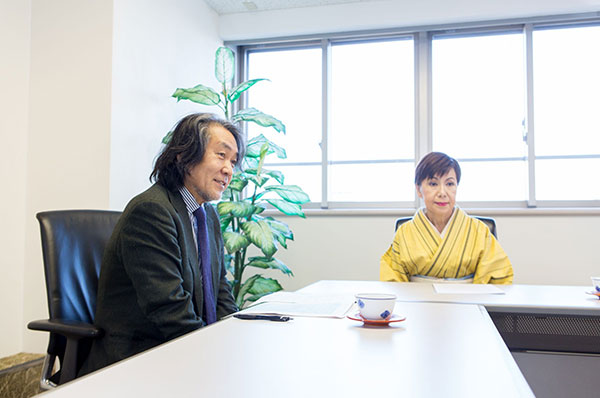
Jinnai:Before Edo-Tokyo studies originated in the early 1980s, academic research on the metropolis in all areas was segmented into the various historical periods. Researchers on Edo-period customs examined only the Edo period, while researchers on modern architecture explored only architecture after the introduction of modern Western civilization in the Meiji era. But people’s lives are continuous rather than segmented, and all historical periods join together seamlessly.
Edo-Tokyo studies originated with the aim of joining the historical segments together to give us a new understanding of Edo-Tokyo from an integrated perspective. Edo-Tokyo studies have successfully joined Edo and Tokyo, and have showed that Edo provided the foundation and archetype for present-day Tokyo.
A stroll around here, Kojimachi, where Hosei University is now located, will reveal many elements derived from Edo.
Edo-Tokyo as a city of water
——Edo-Tokyo studies constitute a field of history based on geographical division, instead of historical division. This feels closer to us than conventional historical studies.
Tanaka:You can trace historical developments from old Shinto shrines and Buddhist temples that are still around today. Many shrines and temples are located at spots that were originally gateways to water bodies and mountains. Although people lives were very closely entwined with the natural environment, they developed these natural lands for their own use. They felt guilty about this and so they erected shrines or temples at which to pray. Natural elements, including water, are very important to Edo-Tokyo, so one of the themes for this research project is “Tokyo as a City of Water.”
Jinnai: Edo gave rise to an interesting everyday culture, including popular culture that used water in various ways. This occurred in not only agriculture but also fishery. No city in the world had as many fishing districts near the downtown areas as Edo, which had Tsukuda-jima, Haneda, and Fukagawa right near its heart. Because people who made their living through fishing and so on were exposed to all kinds of dangers, they were especially pious. So they erected countless shrines dedicated to deities.
Water was deeply ingrained not only in industry but also entertainment. When people went to the theater in Edo, the boat ride was part of the attraction, as well as supporting the logistics. As seen from the fact that the famous spots for viewing cherry blossoms were and are located along waterfronts, most places where people came together were near water.
This means that water in Edo was connected to everything, including everyday life, industry, distribution, and the spirit and culture of local people.
——People’s relationship with water was a huge part of their life. Was Edo originally blessed in terms of its water resources?
Tanaka:Located near the sea, Edo was not blessed with drinking water. To meet demand, water was drawn from the mountain area in the west to the Kanda River, and diverted to underground pipes, which reached the ground under both the residences of daimyos and the row houses where the common people lived. Instead of getting water from taps, people drew it from wells built above the underground pipes. Therefore, the water drawn from wells in Edo was not part of a natural system but was brought in. Edo also had a good sewerage system, and sewers were installed even beneath blind alleys and lanes.
The Edo-Tokyo Museum has a detailed dioramic model of the sewerage system at that time, along with excavated water pipes. I think these exhibits are very revealing.
“Cities inside the city” the cradles of cultural diversity
——Edo-Tokyo had such well-developed waterworks and distribution systems dating very far back. What structural differences did Edo-Tokyo have from cities in Western countries? For example, Paris is known for its radial design. . .

Tanaka:My impression is that Edo-Tokyo had multiple centers, rather than one center on which everything else converged. All of the five highways officially started at Nihonbashi Bridge, but the city itself was comprised of distinctively different districts.
Furthermore, the structure of Edo-Tokyo was unique in that it had cities within it, as seen by the red-light districts and theater districts. While present-day Tokyo has theaters as part of its landscape, in the Edo period a theater district was formed first, and then a number of theaters were built within the district. Districts formed in such a way consisted of nothing but theaters. People related to the theater lived around these districts and served as supporters, livening up the theaters. Edo thus had many dynamic “cities inside the city.”
Taking the example of row houses, row house residents enjoyed a singular form of solidarity. Each of the local fire brigades was in charge of multiple row houses. People formed their own self-governing organization in each residential area, rather than being subject to bureaucratic control.
To continuously update Tokyo
——All this seems to have resulted in Edo being comprised of numerous districts with extremely distinctive features. Tokyo is now in the process of transformation due to the issue of the relocation of the Tsukiji Market toward 2020. What in Tokyo do you think needs to change? What features do you think must be preserved?
Tanaka:There are many things I think must be returned to their former state to make Tokyo’s unique characteristics more prominent. One example is the idea of using waterways. While the Sumida River is currently used for water transport, the Nihonbashi River is also actually capable of carrying boats. Tokyo also has many canals, which I think could be used for transportation.
Use of waterways will provide us with the perspective of “water to land,” in addition to the perspective of “land to water,” which many of us have so far taken. Landscapes designed from such a perspective would be desirable. Although Tokyo has rivers, it has no landscape where people come and go along the banks of a broad river that flows through the heart of the metropolis, as people living along the Thames or the Seine do. I feel a bit regretful about that.
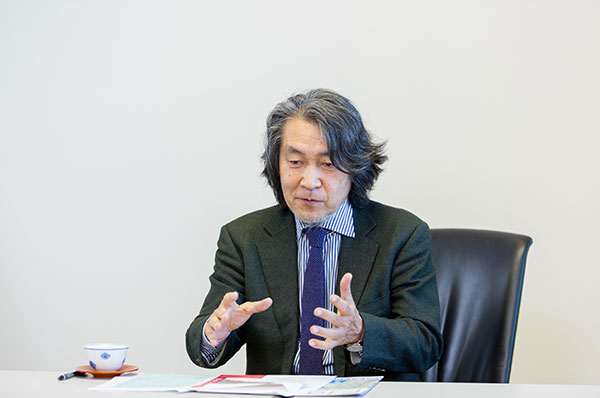
Jinnai: I believe that people should better appreciate the value of beautiful spaces with greenery and water in the heart of the city.
The term “green infrastructure” is now used around the world, denoting an approach toward urban planning that is founded upon using green spaces and water. This term implies a strong trend toward reconsidering modern infrastructure made of concrete and building a more beautiful, more sustainable city. However, Japan has previously done this. Edo had green infrastructure in the true sense of the word.
Edo also had very advanced technologies for that purpose. In addition to the waterway technologies I mentioned before, there were also sophisticated technologies related to plants, including landscape gardening. People at that time planted cherry trees to harden riverbanks. This prevented flooding and at the same time created excellent spots for viewing cherry blossoms.
Since we in the present have more advanced technologies, we could restore greenery and water in an appropriate way to create spaces that would be unique to a near-future Tokyo, if a goal were properly set. However, the preeminence of economic principles makes this difficult. . .
Tanaka:I hope that we will promote the value of “space unique to Tokyo” to create new economic principles someday. This ongoing project can be viewed as directed at that purpose. If we can do it, Tokyo will become a city that is truly unique in the world.
What can be preserved in our ever-changing Tokyo
——You said that a stroll around Tokyo would reveal many elements derived from Edo. What perspective should we take when strolling around Tokyo to get a sense of the relationship between Edo and Tokyo in a fun way?
Jinnai:To enjoy Tokyo while strolling around you should learn something about it. For European cities, you can more or less enjoy walking around looking at old buildings that have barely changed over the years, even if your knowledge is limited. However, once you discover how fascinating Tokyo is from the perspective of a learned connoisseur, European cities may not seem so interesting.
Although Tokyo is continuously changing, you can discover elements that are unchanging. For example, land layout and road networks have changed little since the Edo period. That’s why the base structure of Tokyo has not changed, while things on top of that base structure, including buildings, have changed. I believe Tokyo is both always new and at the same time the oldest.
I think no maps are more interesting than maps of Tokyo. Carry both an old and current map when you stroll around Tokyo, so you can see how Edo has changed to present-day Tokyo and how the city was designed.
Map of Edo in the Tenpo Era (1843)
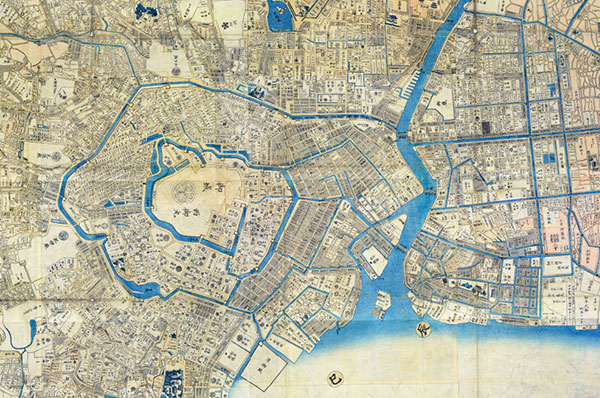
Source: National Diet Library, Japan
Aerial Photograph by the Geospatial Information Authority of Japan (2007)
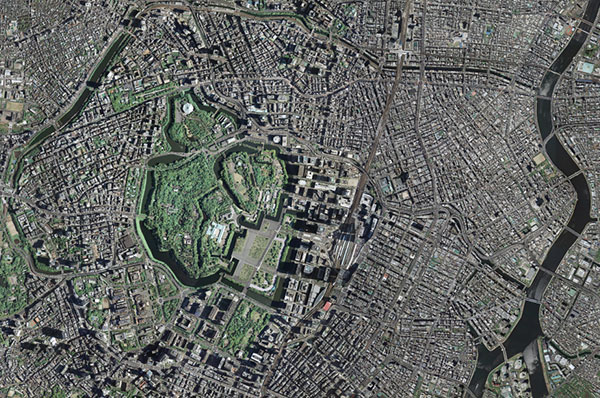
Source: Geospatial Information Authority of Japan
——Comparing old and current maps is interesting. If people can get this kind of information in an easy, lighthearted way, a wider range of people can probably enjoy Tokyo more.
Tanaka:Technologies can probably be used to show us what a certain place looked like long ago. Collaborations with the private sector may create new value in various ways. I believe that if we can share information that can be used by people to stroll around the city as a leisure activity, we will be able to help make Tokyo more interesting, and help people broaden their perspective on history.
——Thank you very much for today.
- Click here for the website of Hosei University Research Center for Edo-Tokyo Studies (in Japanese).
- Click here for the Hosei University website.

